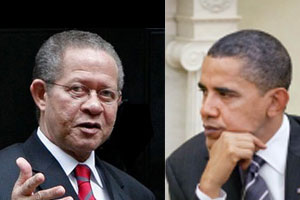Where has it gone wrong for Bruce Golding and Barack Obama? Why have both men, who campaigned on platforms of ‘change’, faltered so badly in running their respective affairs of state?

In September of 2007, the Jamaica Labour Party (JLP) for the first time since 1972, won a general election without Eddie Seaga as its leader. In November of 2008, the Democratic Party in the US, for the first time since 1996, won the White House without a Clinton at the head of the party ticket.
Prior to the 2007 election, Bruce Golding, in an interview, talked about being a transformational leader. He was going to govern differently and better than two immediate predecessors: Portia Simpson and P.J. Patterson of the People’s National Party. Even if he never specifically stated he was going to be a better leader, one got the distinct impression his leadership style and abilities would be superior to what had passed for it up until he took over.
In November 2008, the US elected Barack Obama as its 44th president. For the first time the US had elected someone with a non-European name, and who was not white, as its chief executive. Like Golding, Obama promised to usher in a new type of transformational leadership that would be less partisan than his immediate predecessor.
So, now that both men have been in office for over a year (yes, I know that for Bruce it’s over 2 years!) what have we learned from watching them govern?
Obama the Harvard graduate was a law professor at the University of Chicago. He was also a community organizer and supposedly a pretty effective one. We also know that Obama is biracial with a white mother and black father from Kenya. He spent parts of his childhood in Indonesia and in the American state of Hawaii where he was born, and did well in school.
Golding’s childhood lacked the cross-cultural flavour but in some respects he had it a bit better than Obama did as a young man. Golding was a child prodigy who excelled in school as well as in college (university).
Both men eventually got involved with politics and today find themselves where they are: PM of Jamaica and US President.
I felt it necessary to point out some similarities between the two men and why, in my opinion, they are now perceived as anything but the strong and transformational leaders they portrayed themselves as.
When Golding and the JLP won the 2007 general election, it was the first time since Independence in 1962 that a party had won with a leader who had once resigned from the party and came back to lead it.
The JLP and Golding won because his PNP counterpart, then prime minister Portia Simpson Miller, was seen as not quite as ready and as qualified to lead Jamaica.
In the same vein, Obama and the Democratic Party were swept into power in 2008 (yes, I know the Dems were in control of the US Congress). Obama was seen as being more capable, level-headed and mature than his principal opponent, John McCain. McCain’s judgment was called into question when he chose Sarah Palin as his running-mate and it turned out that the only thing Palin had going for her was her looks and not much else.
We now have two leaders who came into office very much cognizant of the situations they were inheriting: economies that were not as strong as they should have been because of the recklessness and reluctance of the previous administrations to address and fix their structural problems. In the case of Jamaica, it was crime, corruption and competence (or lack of it). In the US, it was an economy that was tanking fast and threatening to take the rest of the world’s economies with it.
Both leaders sought to surround themselves with folks who they believed to be able to get things done but who, as it’s turning out, are not too much different from those they succeeded. We have two leaders who, while academically smart and are personable, seem to be clueless as to just what to do and how to relate to the average person what they want and are trying to do to help them.
Today, one looks at the US and Jamaica and is tempted to say that both leaders are dealing with problems that seem very difficult and/or intractable. There is no doubt that the problems they face are tough but, as with the things both seem to have in common, they have had to deal with a feckless and opportunistic opposition party more content to criticize and whine than to offer solid and concrete proposals.
Not only that, they both have to deal with opposition parties whose leadership is open to question in any and every way possible. All of this, when both have tried to be deferential to the opposition.
The realization is starting to dawn on both men that their leadership styles have been and are being called into question and that business as usual simply won’t cut it. This questioning is not being done only by those in the media but by the average person who wants to hear more than just (happy?) talk. They are starting to realize that deference to others is simply not an option and folks want to not only see them talk about the issues but to seriously address them as well.
Obama, in a recent interview with Diane Sawyer of ABC News said he prefers to be a great one-term president than a mediocre two-term one and Golding seems willing to let history judge his tenure as Jamaica’s PM.
One gets the feeling that both men now seem willing and content to put country ahead of party and thus allowing the opportunity for leadership, as opposed to expediency, to assert itself (we hope).












